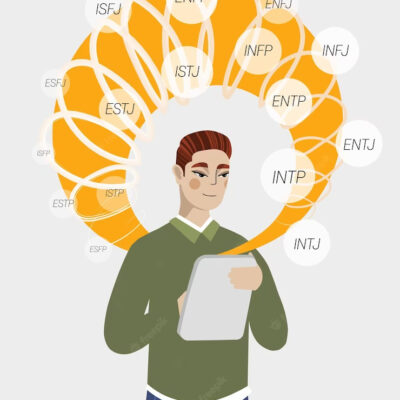The INFJ personality type is one of 16 personality types in the Myers-Briggs Type Indicator (MBTI) classification system. Are you someone who often feels like you just get other people? Do you have a strong sense of empathy and a desire to help others? Do you spend a lot of time reflecting on your thoughts and feelings? If so, you might be an INFJ – also known as the Counselor personality type!
INFJs are known for their unique blend of introverted, sensing, thinking, and judging traits, which make them complex and mysterious individuals. But don’t worry, in this article, we’ll break down the characteristics, traits, and behaviors of INFJs so you can better understand this fascinating personality type. So, let’s dive in!
Overview of the INFJ personality type
INFJ stands for Introverted, Intuitive, Feeling, and Judging, and is one of the sixteen personality types according to the Myers-Briggs Type Indicator (MBTI). INFJs are considered to be rare, comprising only 1-2% of the population. They are known for their empathetic nature, strong intuition, and vision for the future. INFJs are often described as counselors or advocates due to their desire to help others and make the world a better place. They are deep thinkers who are highly self-reflective and introspective.
Key characteristics of the INFJ personality type
One of the defining characteristics of INFJs is their empathetic nature. They have a deep understanding of other people’s feelings and are highly attuned to the emotional needs of those around them. INFJs are often described as “healers” because they have a natural inclination to help others and are adept at providing emotional support and guidance.
Another key characteristic of INFJs is their strong intuition. They have a deep understanding of the underlying meaning and significance of things, and are able to see patterns and connections that others may miss. INFJs often rely on their intuition to make decisions and guide their actions.
INFJs are also highly introspective and self-reflective. They spend a lot of time analyzing their thoughts, feelings, and motivations, and are constantly striving to better understand themselves and their place in the world. INFJs are often deeply philosophical and may be drawn to spiritual or metaphysical pursuits.
Finally, INFJs are known for their vision and their desire to make the world a better place. They have a strong sense of purpose and mission, and are driven by a deep desire to help others and create positive change. INFJs are often natural leaders who inspire and motivate others to work towards a common goal.
Examples of famous people with the INFJ personality type
Some famous people who are believed to be INFJs include:
- Martin Luther King Jr.
- Mother Teresa
- Nelson Mandela
- Mahatma Gandhi
- Oprah Winfrey
- Nicole Kidman
- Carrie Fisher
- Emily Blunt
- Benedict Cumberbatch
- Cate Blanchett
These individuals are known for their strong sense of purpose, their empathy, and their ability to inspire and motivate others. They are often remembered for their contributions to society and their efforts to make the world a better place.
Strengths of the INFJ Personality Type
Positive traits associated with the INFJ personality type
INFJs possess several strengths that make them valuable members of society. These strengths include:
- Empathy – INFJs have a remarkable ability to understand and empathize with others. This helps them build strong relationships and provide emotional support to those around them.
- Visionary thinking – INFJs are known for their ability to see the big picture and envision a better future. They are often creative and innovative, and have a knack for coming up with unique and effective solutions to problems.
- Insightfulness – INFJs possess a deep understanding of human nature and can often see through superficial appearances to get to the heart of the matter. This makes them valuable counselors and advisers.
- Determination – INFJs are highly motivated and driven individuals who are committed to their goals. They are willing to put in the hard work and persevere through challenges to achieve success.
- Integrity – INFJs are known for their strong sense of ethics and their commitment to doing what is right. They are often guided by a set of values and principles that they hold dear.
Examples of how these strengths can be beneficial in different situations
INFJs’ strengths can be beneficial in a variety of situations. For example:
- In the workplace – INFJs are often valued for their ability to work well with others and their strong work ethic. Their empathy and insightfulness can make them excellent managers, counselors, or customer service representatives.
- In personal relationships – INFJs’ empathy and ability to understand others’ emotions can make them excellent partners, friends, and family members. They are often valued for their deep commitment to their relationships and their willingness to provide emotional support.
- In social activism – INFJs’ visionary thinking and determination can make them powerful agents of change. They are often drawn to causes that align with their values, and are willing to work tirelessly to bring about positive change in their communities and beyond.
Real-life examples of successful individuals with the INFJ personality type
There are several real-life examples of successful individuals with the INFJ personality type. Some notable examples include:
- Martin Luther King Jr. – King was a visionary leader who worked tirelessly to bring about racial equality and social justice. His empathy, determination, and integrity made him an inspiring figure and a powerful agent of change.
- Mother Teresa – Mother Teresa was a Catholic nun who dedicated her life to helping the poor and sick in India. Her empathy and commitment to service made her a beloved figure around the world.
- Nelson Mandela – Mandela was a South African anti-apartheid revolutionary and politician who served as the country’s first black president. His visionary thinking and determination helped him lead the fight against apartheid and bring about positive change in South Africa.
- Oprah Winfrey – Winfrey is a media mogul and philanthropist who has used her platform to promote social justice and positive change. Her empathy and insightfulness have made her an effective interviewer and counselor.
Overall, the strengths of INFJs make them valuable members of society who are often able to make a positive impact on the world around them.
Weaknesses of INFJ Personality Type
Negative traits associated with the INFJ personality type
Like any personality type, INFJs also have weaknesses that can be detrimental to their personal and professional lives. Some of the common negative traits associated with INFJs include:
- Perfectionism – INFJs have high standards for themselves and those around them, which can lead to a tendency towards perfectionism. This can cause them to become overly critical and rigid, which can strain relationships and hinder progress.
- Overthinking – INFJs have a tendency to overanalyze and ruminate on their thoughts and feelings, which can lead to anxiety and self-doubt. This can also cause them to become indecisive and miss out on opportunities.
- Sensitivity – INFJs are highly attuned to the emotions and needs of others, which can make them vulnerable to emotional overload and burnout. This can also lead to a tendency to avoid conflict and difficult conversations.
- Idealism – INFJs have a strong sense of what is right and just, which can lead to a tendency towards idealism. This can cause them to become disillusioned and disappointed when reality does not live up to their expectations.
Examples of how these weaknesses can be detrimental in different situations
INFJs’ weaknesses can be detrimental in a variety of situations. For example:
- In the workplace – INFJs’ perfectionism and overthinking can cause them to become overly critical and indecisive, which can hinder productivity and progress. Their sensitivity can also make them vulnerable to burnout and emotional exhaustion.
- In personal relationships – INFJs’ idealism can lead to unrealistic expectations and disappointment when their partner or friends do not live up to their expectations. Their sensitivity can also lead to avoidance of conflict, which can strain relationships.
- In social activism – INFJs’ idealism can cause them to become disillusioned and frustrated with the slow pace of progress, which can lead to burnout and disengagement from the cause.
Strategies for managing these weaknesses
There are several strategies that INFJs can use to manage their weaknesses and prevent them from becoming too detrimental. Some of these strategies include:
- Practicing self-care – INFJs need to take time to care for themselves and manage their emotions to prevent burnout and emotional overload.
- Seeking feedback – INFJs can benefit from seeking feedback from trusted friends and colleagues to help them gain perspective and avoid becoming overly critical.
- Developing decision-making skills – INFJs can benefit from developing decision-making skills to avoid becoming paralyzed by indecision and missing out on opportunities.
- Practicing acceptance – INFJs can benefit from practicing acceptance and recognizing that not everything can be perfect or ideal. This can help them avoid becoming disillusioned and disappointed.
Overall, by being aware of their weaknesses and developing strategies to manage them, INFJs can prevent them from becoming too detrimental and continue to thrive in their personal and professional lives.
Relationships and Communication
How INFJs interact with others
INFJs are known for their strong empathetic abilities and desire to connect with others on a deep level. They are compassionate, kind, and genuinely interested in understanding the thoughts and feelings of those around them. They often approach relationships with a sense of idealism, seeking to create meaningful connections based on shared values and beliefs. However, INFJs can also be private and reserved, which can sometimes make it difficult for others to get to know them.
Common communication styles of the INFJ personality type
INFJs tend to communicate in a thoughtful and reflective manner. They often take their time to consider their words carefully, seeking to express themselves in a way that is clear and meaningful. They may also use metaphors, analogies, and other creative languages to convey their thoughts and feelings. INFJs value authenticity and may struggle with small talk or superficial conversations.
In addition, INFJs may also struggle with assertiveness, particularly when it comes to expressing their own needs and desires. They may fear conflict or upsetting others, which can sometimes lead to passive-aggressive behavior or avoiding difficult conversations altogether.
Tips for communicating effectively with someone of the INFJ personality type
When communicating with an INFJ, it is important to be patient and understanding. Give them time to reflect and express themselves in their own way, without pressuring them to speak before they are ready. Try to create a comfortable and safe environment where they feel free to share their thoughts and feelings.
It can also be helpful to avoid small talk and instead focus on topics that are meaningful and important to the INFJ. Ask open-ended questions that allow them to share their perspectives and ideas. However, be careful not to pry too deeply or push them too far out of their comfort zone.
Finally, it is important to be respectful of the INFJ’s boundaries and need for privacy. Don’t pressure them to share more than they are comfortable with, and avoid putting them in situations where they feel exposed or vulnerable. By being patient, understanding, and respectful, you can build a strong and meaningful relationship with an INFJ.
Careers and Work Habits
Ideal work environment
INFJs thrive in work environments that allow them to express their creativity and engage in meaningful work that aligns with their values and beliefs. They often seek out work that allows them to help others and make a positive impact in the world. An ideal work environment for an INFJ is one that is collaborative, supportive, and allows for a degree of autonomy and flexibility.
Common career paths
Some common career paths for INFJs include counseling, psychology, social work, teaching, writing, and the arts. They may also be drawn to careers in non-profit organizations or advocacy groups, where they can work towards making a positive impact in the world. INFJs are also well-suited to careers in healthcare, where they can use their empathetic abilities to provide care and support for others.
Work habits and behaviors
INFJs are typically very hardworking and dedicated individuals. They are often detail-oriented and strive for excellence in all that they do. INFJs may also be perfectionistic and may struggle with letting go of projects or tasks that they feel are not yet complete. They may also be prone to overworking themselves or neglecting their own needs in pursuit of their work.
In addition, INFJs may struggle with assertiveness in the workplace, particularly when it comes to advocating for themselves or their ideas. They may also be prone to taking on too much responsibility or overcommitting themselves, which can lead to burnout or stress.
Overall, INFJs thrive in work environments that allow them to use their empathetic and creative abilities to make a positive impact in the world. By being aware of their own work habits and behaviors, INFJs can take steps to manage their workload and advocate for themselves in the workplace.
Personal Growth and Development
Challenges and opportunities for personal growth
Like all personality types, INFJs face unique challenges and opportunities for personal growth and development. One of the biggest challenges for INFJs is learning to manage their intense emotions and sensitivity to others. They may also struggle with setting boundaries and advocating for themselves in relationships and the workplace.
However, INFJs also have many opportunities for personal growth, particularly when it comes to cultivating their creativity and pursuing their passions. They can also benefit from developing their assertiveness and learning to communicate their needs effectively.
Strategies for overcoming common obstacles
To overcome common obstacles associated with the INFJ personality type, individuals can take a number of steps. These may include:
- Practicing self-care and setting healthy boundaries to manage their emotions and energy levels
- Developing assertiveness skills and learning to communicate their needs effectively
- Engaging in creative pursuits or hobbies to cultivate their passion and creativity
- Seeking out supportive relationships and community to build a sense of belonging and connection
- Working with a therapist or coach to develop a deeper understanding of their personality type and address any areas of personal growth or development.
Examples of individuals who have successfully navigated personal growth and development with this personality type
There are many examples of individuals who have successfully navigated personal growth and development with the INFJ personality type. For example, author and humanitarian, J.K. Rowling, has spoken openly about her struggles with depression and how writing provided an outlet for her emotions and helped her to heal. Another example is musician and activist, John Lennon, who used his creativity and platform to advocate for peace and social justice.
Overall, by recognizing their unique challenges and opportunities for growth, INFJs can take proactive steps to develop their strengths and overcome their weaknesses, leading to a more fulfilling and satisfying life.
In conclusion, the INFJ personality type is a fascinating and complex one, characterized by creativity, empathy, and a deep desire to help others. While INFJs face unique challenges and obstacles, they also have many strengths and opportunities for personal growth and development. By learning to manage their emotions, communicate effectively, and pursue their passions, INFJs can lead fulfilling and meaningful lives.
If you’re an INFJ, I hope this article has provided you with some valuable insights and strategies for navigating your personality type. And if you’re not an INFJ, I hope you’ve gained a better understanding and appreciation for the unique qualities and contributions of this personality type. Remember, no matter what your personality type may be, there is always room for growth, development, and self-discovery.
This piece is a preserved fossil from our earlier ecosystem—beautiful, but part of a simpler food chain. The evolution has been… spectacularly messy. If the core of this resonated with you, your soul might be ready for the full, neurodivergent taxonomy. The journey continues. If you’d like to fuel the next phase of exploration, you can support it here.
Also read: INTJ personality type – The Mastermind











No Comment! Be the first one.